5+ Books to Learn About Queen Elizabeth II’s Colonial Legacy
Girlboss, Gaslit, and Genocide.
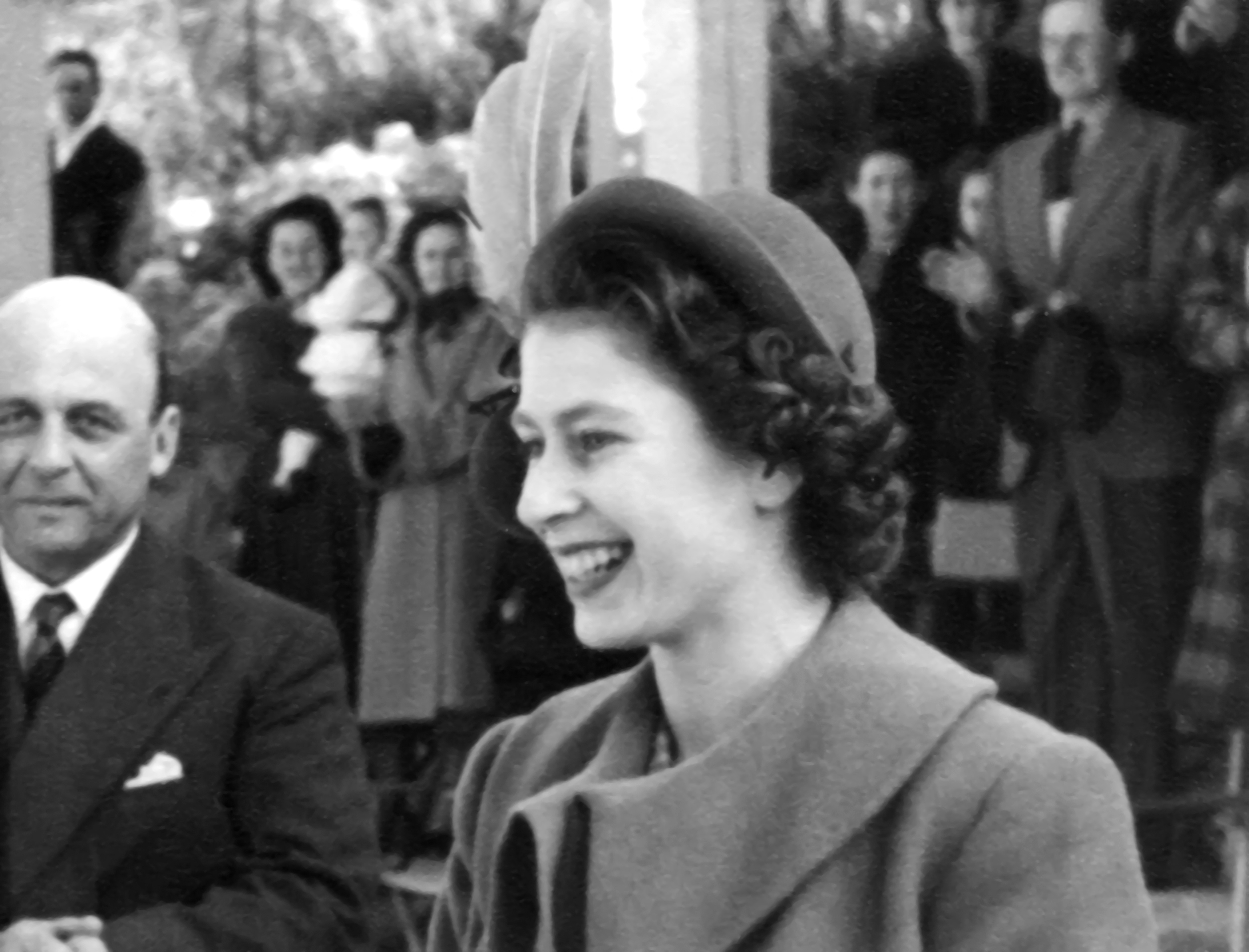
Elizabeth II learned of her father’s passing in Keyna while on tour across the commonwealth to appease the independence movements across the world, and she died in the Kingdom of Scotland, acquired by her nation’s earliest colonization efforts. From the start and close of her tenure as head of state, Elizabeth II chose to continue the legacy of empire until the very end. In acknowledgment of her death and legacy, I’ve put together a list of things to read about the U.K.’s colonial and neocolonial history over the last 70 years.
Following the Queen’s passing, even people outside of the U.K. are excusing the genocidal actions of the British Empire and trying to paint the her (and others) as benevolent masters, conveniently ignoring simultaneous world events (like the Haitian Revolution) and independence groups.
Elizabeth was very involved with political lobbying for (among other things) to maintain her accumulated wealth that came from the continued theft from nations that had been colonized or conquered by the U.K. in the past, and her inaction in the face of genocide, torture, ethnic cleansing, sex trafficking (even in her own family) should be enough to quiet the royalist hysterics over he death. These actions and many more makes her (and all family following the tradition of royalty) culpable for both historical actions and the present day.
Even if she were as passive as people claim, as we see with press secretaries in the U.S., being the PR face of something or someone actually doing the violence more directly doesn’t absolve them from these actions or the lies to downplay this harm. And she was obviously more than a press secretary; she was the face of the nation worldwide. Because the U.K.’s colonial violence is so intensive, even though I’m mostly sticking to everything after Elizabeth became queen (Feb. 6, 1952 onward), I won’t be able to cover every country or even region. I hope this inspires you to read, watch, and listen to more of the places most affected.
The Blood Never Dried: A People’s History of the British Empire by John Newsinger
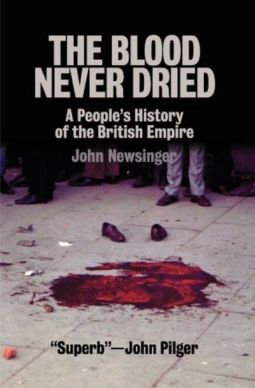
You might have heard the phrase “the sun never sets on the British Empire,” referring to at some point, the country had colonies in every-single timezone in the world. This book plays on an assessment of this note in 1851 by Ernest Jones: “on its colonies the sun never sets but the blood never dries.” Newsingers’ book takes a broader look at the British Empire than others on this list, but is vital if you want to learn more about the power the Queen willingly stepped into (and continued to hold for seven decades) with greater detail. Instead of a timeline, the book sequesters moments and time into distinct chapters.
The Blood Never Dried ends with detailing the U.K.’s (at the time) latest involvement in Iraq. In his 2015 book British Counterinsurgency, Newsinger challenges the so-called defense strategy after from 1945 forward across the world.
Massacre in Malaya: Exposing Britain’s My Lai by Christopher Hale
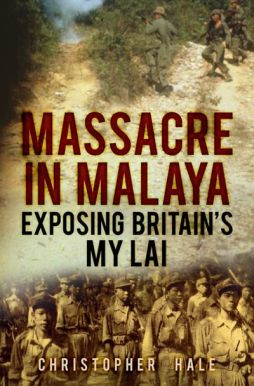
While Britain’s history in the Pacific is usually framed (understandably) around the Opium Wars and both world wars, there are many colonial pursuits, including the encroachment on the Kingdom of Hawai’i (where the British Flag is still a part of the occupied states’ flag), the decimation of Aboriginals in Australia, and many other island nations across the sea. This book follows the journey to the independence of Malaysia that took place mostly during Elizabeth’s reign. The author and others describe the actions of the U.K. as equal in brutality to the U.S.’s actions in Vietnam later in the decade, even though the death toll was ultimately smaller.
Imperial Reckoning: The Untold Story of Britain’s Gulag in Kenya by Caroline Elkins
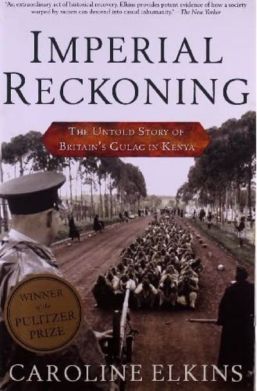
One of the most cited and very specific examples of why people were not vibing with the call for respectability in the face of violence is the Mau Mau Uprising in Kenya in the 1950s to 1960. On the lower end, over 10,000 people died at the hand of the British military, and many more were tortured in concentration camps. The camps held roughly 20,000 Mau Mau and 1.5 million Kikuyu people. Survivors’ voices were highlighted during the Queen’s Jubilee in 2022. On the day of Elizabeth’s death, families shared primary documents of this massacre online.
If you like her writing style, Elkin’s book Legacy of Violence: A History of the British Empire was released this summer and you can hear from her on NPR‘s Fresh Air.
How Britain Underdeveloped the Caribbean: A Reparation Response to Europe’s Legacy of Plunder and Poverty by Hilary MCD Beckles
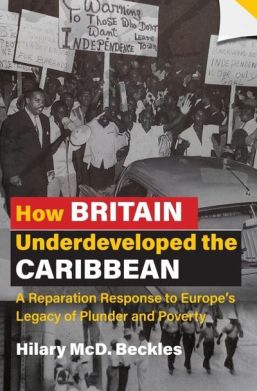
While the U.K. may not have been able to be as successful at murder and cultural dominance in Latin America, they do maintain a lot of control over the Caribbean. A follow-up to his 2013 book Britain’s Black Debt: Reparations for Caribbean Slavery and Native Genocide, this book shows the way the crown and parliament continued only to support systems that would enrich the English. Because it takes a look at the whole 20th century, much of this took place before her tenure. Not only is this still set up today, but Elizabeth’s son (now, King Charles III) is inheriting it, and is why it was big news when Barbados became a republic in 2021.
Something I’ve learned in reading and learning about the relationship between commonwealth nations (including those in the Caribbean) is that despite having the royals on their money and the expectation of fanfare when they visit, none of these “subjects” can even visit the U.K. without going through the same legal passport system as someone else from a non-associated country.
The Year of Chaos: Northern Ireland on the Brink of Civil War, 1971-72 by Malachi O’Doherty
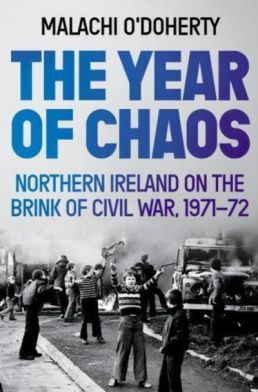
From banning aspects of culture (like language and food) to newly imposed borders, the violence waged against the Scots and the Irish was a primary testing ground during the British Empire, so I needed to include a book on some of these events (there are many, should you wish for further reading). This book covers one of the worst years for Irish civil rights under Elizabeth’s time in power.
While there is one widely acknowledged partition created in Pakistan/India, hundreds more partition-like structures (all with unique histories only similar to who made the mess) have been created thanks to U.K. imperialism. Some include Ireland/Northern Ireland, Zambia/Zimbabwe, Israel/Palestine, and hundreds of (Northern) Native American nations. For a brief overview of every place they made a mess in (to put it very lightly), check out All the Countries We’ve Ever Invaded: And the Few We Never Got Round To by Stuart Laycock.
 You will find more infographics at Statista
You will find more infographics at Statista —
Which books would you include on this list?
(featured image: McCarthy’s PhotoWorks / Shutterstock.com )
The Mary Sue may earn an affiliate commission on products and services purchased through links.
—The Mary Sue has a strict comment policy that forbids, but is not limited to, personal insults toward anyone, hate speech, and trolling.—
Have a tip we should know? [email protected]
